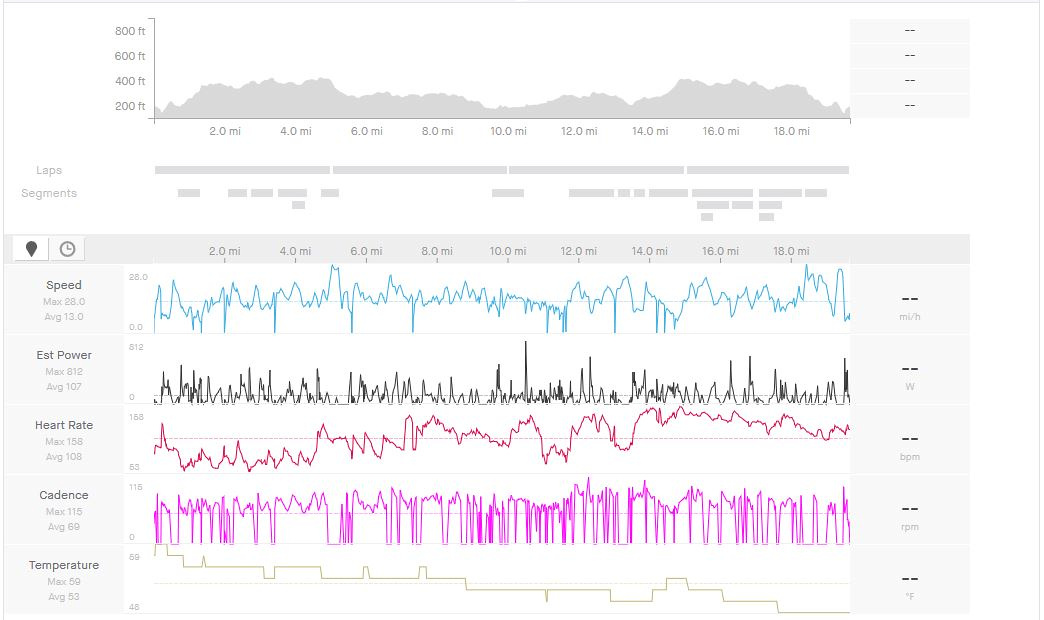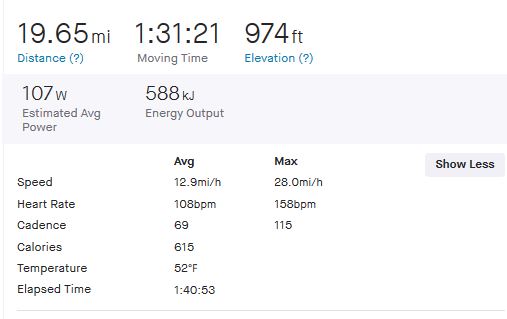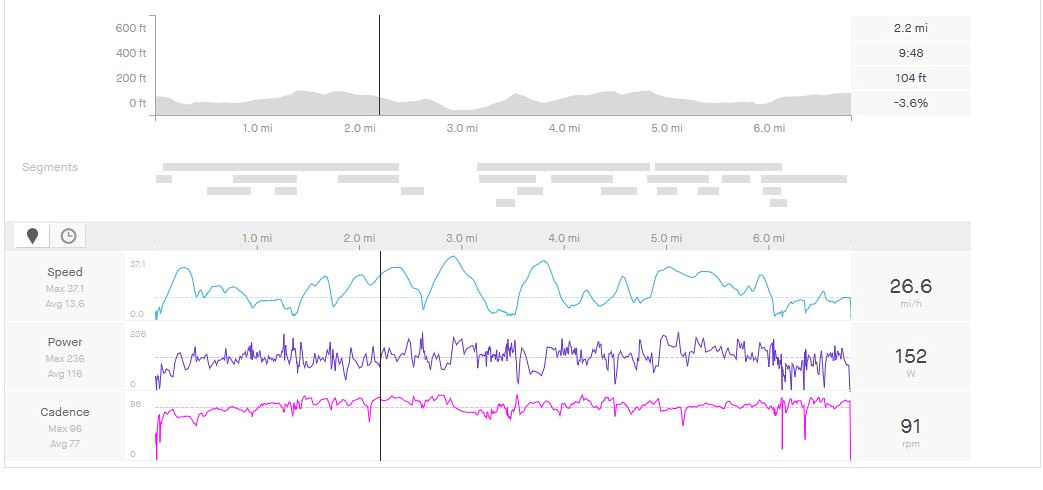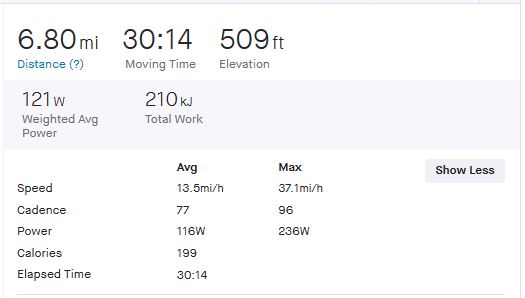


 |
 |
 |
|
#31
|
|||
|
|||
|
Quote:
Yeah, riding on the road is still kind of hairy. I have been doing more MUP riding when I can. I was kind of nervous yesterday because I couldn't get my Fly12CE to work correctly and almost didn't go.
__________________
Dean El Diente BH Lynx 4.829 Jamis Ventura (Kickr) |
|
#32
|
|||
|
|||
|
Quote:
__________________
Dean El Diente BH Lynx 4.829 Jamis Ventura (Kickr) |
|
#33
|
|||
|
|||
|
Quote:
I suppose a person who is motivated but highly time limited might purposely choose an exercise which has the fastest calorie burn, but for many people staying motivated and diligent can be a challenge, so it might be better to choose an exercise that they actually want to do (and keep doing). After all, weight loss and health are not events, but are processes. |
|
#34
|
|||
|
|||
|
Quote:
also 100% agree with what Marc McM says above. most important part is doing something you enjoy doing and will thus continue to do. |
|
#35
|
|||
|
|||
|
Quote:
__________________
Dean El Diente BH Lynx 4.829 Jamis Ventura (Kickr) |
|
#36
|
|||
|
|||
|
Quote:
So unless I'm missing a trick - and more than happy to be corrected - work into the pedals isn't the same as calories burnt. |
|
#37
|
|||
|
|||
|
Also for what it's worth my Garmin with power meter seems to go with 500 calories per hour when riding fast/hard in hilly and undulating terrain.
I take this with grain of salt, weight isn't falling off me and I certainly don't eat 2000 calories to 'balance the ledger' after a 4 hour ride. |
|
#38
|
||||
|
||||
|
Quote:
1 Calorie=4.186 kJs. Full read here: https://zwiftinsider.com/how-many-calories/ Strava Definition: Total Work Total Work, expressed in kilojoules (kJ), is simply the sum of the watts generated during your ride. There is a close 1–to–1 ratio with Total Work and Calories expended during a ride. Last edited by kppolich; 02-18-2020 at 06:17 PM. |
|
#39
|
|||
|
|||
|
Quote:
|
|
#40
|
|||
|
|||
|
Quote:
For whatever reason, kiloCalorie in the U.S. got turned into simply as "Calorie" on food labels (as a side note, the food I bought in the Netherlands have listings under kJ and KCal, but not Cal) ----------------------------------------------------------- As for the physics lesson, energy = power * time. kCal and kJ are both units of energy. Watt is a unit of power and is defined as 1 J/s. Say someone averages 300 W for an hour, the work (defined as energy output by person/thing) is 300 J/s * 3600s = 1,080,000 J or 1,080 kJ For someone who is 21% metabolically efficient, that amount of work done would require ~5150 kJ of energy burned. For someone who is 25% metabolically efficient, it would require 4320 kJ. Still a bit of scatter. It just so happens that 1 kJ = 0.239 kCal, and for simplicity, we have the approximation that 1 kJ of work done (as measured by a power meter) ~ 1 kCal of energy consumed. This approximation is still a lot better than what most other approximation provides, alas the prevalence in its usage. |
|
#41
|
|||
|
|||
|
Quote:
I was just confused at work on the pedals being stated as the calorie burnt, which it is not. Quote:
https://sportsscientists.com/2010/07...t-is-possible/ |
|
#42
|
|||
|
|||
|
Closing the loop.
I did a 30 minutes ride last night and the calories calculated by Wahoo Kickr is similar to what Strava estimated for Monday's ride. And they are about 2/3 of what the online calculators estimated. The number of calories I burn is about 400/hr or 600/90 mins, so not 900s. I am surprised that the Strava estimated average power (107) is very close to the Kickr's value (116.) Monday's ride:   Last night:  
__________________
Dean El Diente BH Lynx 4.829 Jamis Ventura (Kickr) |
|
#43
|
|||
|
|||
|
Time to get a PM. They’re very affordable these days.
I’m taller and lighter than you are, that estimate would be very high for me. I do have PMs on my 2 road bikes. I’m super out of shape right now. Winter and injuries unfortunately. My last ride said 500 calories. 52 minutes @14.5 mph with 627ft of elevation gain. Heavy bike and draggy winter clothes. Avg power 160ish, normalized power 190ish. I don’t know, I’d rather gain some mass these days, but maybe it’s just cause everyone else is huge. I have definitely burned 1000 calories in 90 minutes but more like averaging 18-19mph solo with > 1000ft of elevation gain, average power 200 or so. It’s not linear. Last edited by benb; 02-21-2020 at 12:29 AM. |
|
#44
|
|||
|
|||
|
Just a thought; wattage is very cadence dependent. Many find more efficient power output at a cadence of 90. Shifting to a slightly easier gear and maintaining a faster cadence might allow you to have a higher wattage. Maximal speed should be related to wattage as well.
If the goal is to control weight, nothing impacts my weight more than diet. Enjoy! |
|
#45
|
||||
|
||||
|
Quote:
Efficiency of the human body isn't that simple. First, it's a moving target, it changes with time. Second, people aren't on/off switches, the increase in metabolic rate doesn't stop when the pedals stop. If you must use accurate measuring devices to get a precise number, I suggest this exercise: Get yourself a digital caliper and go measure a block of jello at room temperature... Here's what I tell the riders I coach: Winter is about base mileage. Base mileage has a number of goals which can't be confused with the goals of later, more intense workouts. The primary goal of base mileage is to drain the battery and teach the body how to recover. This has to be done at low intensity (zone 3 - you should be able to talk while riding), it's slower than you think and longer than you can imagine. If you don't start taking a mental inventory of your refrigerator an hour before you get home, you're not spending enough time on the bike. here's the simple equation: you start out with 1500 - 2000 calories, you burn 600cal/hr, the best you can hope to process is 300cal/hr while riding. Given a target of 4 hours to drain the battery, the eating part becomes the most important factor (and the only one you can control). I'll skip the part about base mileage being a learning stage in pedal stroke work 'cause nobody [else] spends that much time thinking about how they pedal, and get right to the real reason(s) for base mileage. At some point next season you're going to want to go on a really long ride, be it a century, a charity ride or you just get really lost. Learning how to eat on the bike, teaching your body to both turn the pedals and process food, is how you finish in style instead of that death march I see so often. If you're actively training for something you'll hear the term TSS or Training Stress Score, which is how intelligent athletes keep themselves from overtraining. Base mileage, the act of draining the battery and recovering, increases TSS capacity. So the long, low intensity work in the winter pushes the high intensity work later on - it doesn't work the other way around. Should I bring up fixed gears now???
__________________
If the pedals are turning it's all good. |
 |
|
|